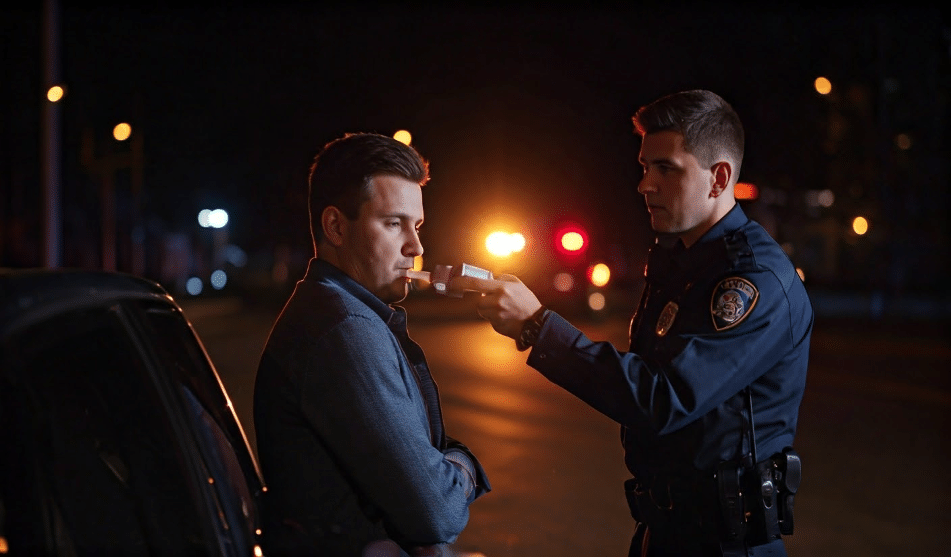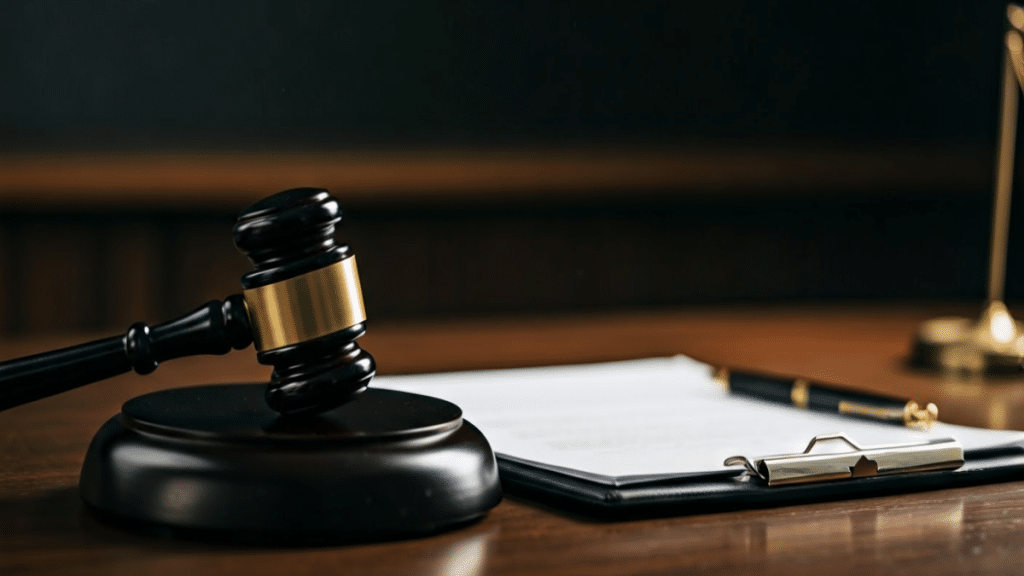Understanding DUI Charges in Toronto
Driving under the influence of alcohol or drugs is a big deal in Toronto. It can lead to serious legal consequences. A DUI charge covers different offenses linked to driving a motor vehicle while you are impaired.
It’s important to know that a DUI charge is not just about being seen driving. The law states you can still be charged if you have “care and control” of a vehicle while impaired. This means that even if you are just sitting in a parked car with the keys, you could get a DUI charge if you’re found drunk.
The Legal Definition of DUI in Ontario
The legal meaning of DUI in Ontario comes from the Criminal Code of Canada. It says that impaired driving is when your blood alcohol concentration (BAC) is over 80 milligrams of alcohol in 100 milliliters of blood. People often call this “over 80.”
But remember, an impaired driving charge is not just about BAC. Even if your BAC is below the limit, you can still be charged. This is true if alcohol or drugs clearly impair your ability to drive.
Police officers look for signs of impairment. They notice things like how you drive, how well you can do physical coordination tests, and your behavior during stops. Any proof showing that your ability to drive safely is affected can result in an impaired driving charge.
Factors Leading to a DUI Charge
Many things can lead to a DUI charge in Toronto. The most common reason is having a blood alcohol limit over 80mg. If a police officer thinks you are driving under the influence, they may ask you to give a breath sample with an approved screening device.
Besides your blood alcohol level, an officer may charge you for how you drive. Things like swerving between lanes, speeding, or being slow to respond to traffic signals can make them suspicious.
Also, how you act when talking to the police officer can help lead to a DUI charge. Signs like slurred speech, bloodshot eyes, or the smell of alcohol can affect their decision.
Types of DUI Offenses in Toronto

In Toronto, different types of DUI offenses can bring serious legal problems. It is important to know these differences to understand the possible charges you could receive.
Some common types are “Over 80mg BAC Level Charges,” “Refusal to Provide a Breath Sample,” and “Impaired Driving.” Each offense has its own penalties, showing how serious DUI charges are in the city.
Over 80mg BAC Level Charges
One common DUI offense in Toronto is having a blood alcohol content (BAC) over 80mg. This is a crime under the Criminal Code of Canada and comes with serious consequences.
If your BAC goes over 80mg, you will be arrested and charged with a DUI. The penalties you face depend on your BAC level, if you have previous DUI offenses, and if there were any aggravating factors, like causing an accident.
The penalties might include fines, losing your license, jail time, and being required to join alcohol education programs. It is important to understand that even a first-time offense for “over 80mg” can greatly affect your life in the long run.
Refusal to Provide a Breath Sample
Refusing to provide a breath sample to a police officer in Toronto is a serious offense. It can lead to consequences similar to driving with a high BAC. This refusal is a criminal charge, separate from a DUI charge.
Police officers can ask for breath samples if they think you have been driving while impaired. If you refuse without a valid medical reason, it is seen as an admission of guilt. This can bring immediate penalties, like losing your license and having your vehicle towed.
It’s important to know that even if you feel you are wrongly suspected, refusing the breath sample can hurt your case. It is always best to comply with the officer’s request. Afterward, consult a DUI lawyer to protect your rights.
Consequences of DUI Convictions in Toronto
A DUI conviction in Toronto can seriously impact your life. It can cause more problems than just the legal penalties you face. The effects depend on things like your Blood Alcohol Concentration (BAC) level, whether this is your first offense or not, and if any serious issues were present.
You may face high fines, a driver’s license suspension, possible jail time, and a criminal record. These consequences are significant. Additionally, a DUI conviction can raise your insurance premiums, limit your travel, and make it hard to find a job.
Short-term Penalties for First-Time Offenders
Even if it’s your first time getting a DUI, the penalties in Toronto are serious. You will need to pay a minimum fine of $1000. Your license will also be suspended for at least one year. If your case is more serious, like if you have a high BAC or caused an accident, you might face a short jail sentence.
On top of these automatic penalties, a DUI conviction brings other immediate consequences. You may need to put an ignition interlock device in your car, which makes it hard for you to drive. You will also see a big rise in your insurance premiums, showing the higher risk that comes with a DUI conviction.
Dealing with these penalties can be tough. This makes it very important to get legal help right away after being charged. A DUI lawyer can help you understand the legal steps, explain your rights and duties, and work to reduce the immediate effects of the charges.
Long-term Impacts on Repeat Offenders
A DUI conviction in Toronto can lead to serious long-term effects, especially for repeat offenders. They may face larger fines and longer license suspensions. In addition, they might have to serve jail time, which can last for several months.
Every time someone gets a DUI, it can lead to a criminal record. This can limit job chances and might even make it hard to travel to some countries. The negative views linked to having a criminal record can cause struggles in many parts of life.
Repeat offenders also deal with big financial costs. Insurance premiums go up a lot. They may have to take part in the ignition interlock program for a long time too. All these consequences show how serious DUI charges are in Toronto. It is very important to get help from a professional lawyer.
Navigating the Legal Process for DUI Charges

Being charged with a DUI in Toronto can feel scary and confusing. It is important to know the legal steps and your rights. This knowledge will help you handle this tough situation better.
From your arrest to the time you go to court, understanding what happens at each stage is key. This knowledge will help you create a strong defense.
Steps to Take Immediately After Being Charged
After getting a DUI in Toronto, it is important to act quickly. Staying calm and working with the police is key. Most importantly, remember your right to remain silent. Anything you say might be used against you in court.
The next step is to call a DUI lawyer right away. A DUI lawyer who knows impaired driving laws can help you with the legal process and make sure your rights are protected. They will work hard for the best outcome for you.
It is crucial to move fast, as evidence needs to be collected and looked at quickly. A DUI lawyer can question the breathalyzer test’s reliability, check how the police acted, and gather proof to build a strong defense for you.
How to Prepare for Your Court Appearance
Preparing for your court date is very important when facing a DUI charge in Toronto. It’s not just about being there; it’s about having a solid defense and knowing what will happen in court.
Start by collecting all the important documents. This includes the police report, breathalyzer test results, and any talks you had with your insurance company. Next, set up a meeting with a skilled DUI lawyer. They will look over your case, explain what might happen, and create a legal plan just for you.
During the meeting, be honest about your case. Your lawyer needs to know everything to build the best defense. This means telling them about any medicine you were taking, what happened before your arrest, and any witnesses who can help your case.
The Role of a DUI Lawyer in Toronto
Facing a DUI charge in Toronto can be tough. That’s why having a good DUI lawyer is important. They are there to help you and navigate the complicated legal system. Their job is to protect your rights.
A DUI lawyer knows a lot about DUI laws, court rules, and how to defend you. Their skills help them to fight against the prosecution. They can also negotiate with the Crown and work to build a strong defense that could lessen the penalties you may face.
When to Hire a DUI Lawyer
The best time to hire a DUI lawyer is right after you are charged with a DUI in Toronto. The quicker you get legal help, the better your lawyer can protect your rights and create a strong defense.
Keep in mind that DUI cases have strict deadlines. Evidence needs to be collected quickly. Your lawyer can begin working on your case right away, even before your first court date.
Many DUI lawyers offer a free first meeting. This is a great chance to talk about your case and learn about your legal choices. During this meeting, the lawyer can look at your case and help you decide what to do next.
Benefits of Having Legal Representation
Having a good DUI lawyer when facing a DUI charge in Toronto is very helpful. A DUI lawyer works for you. They help you understand the complicated legal system and protect your rights during the process.
DUI lawyers know DUI laws and legal rules very well. They can find mistakes made by the police. They can also question if the evidence can be used against you. Then, they create a strong defense that fits your specific situation.
Their experience in talking with the Crown Prosecutor can help get lighter charges or easier penalties. Many times, having skilled legal help has led to favorable verdicts for clients. This shows why it is important to get legal support in DUI cases.
Strategies for Defending DUI Charges
Defending a DUI charge in Toronto needs careful planning based on your case. Good DUI lawyers use different tactics to fight the evidence against you and keep your rights safe.
They look closely at how police acted, whether breathalyzer tests were done correctly, and if your Charter rights were violated. By focusing on the weak points in the Crown’s case, DUI lawyers want to get the best result for their clients.
Challenging the Breathalyzer Results
Challenging breathalyzer results is a common way to defend against DUI charges. It’s important to know that breathalyzer tests can be wrong. Many things can change the readings and lead to false results.
A DUI lawyer can question the breathalyzer results by looking into:
- Proper Calibration and Maintenance: Was the breathalyzer checked and calibrated on the day you were arrested? Are there maintenance records that show any problems with the device?
- Compliance with Testing Procedures: Did the officer follow the right steps when giving the breathalyzer test? If they did not, this may change how accurate the results are.
- Your Physical Condition: Some health issues or medicines can change how a breathalyzer works.
By carefully checking these points, a DUI lawyer can create doubt about the breathalyzer results. This can help support your defense against the DUI charges.
Arguing Unlawful Police Stops
Another effective strategy for defending DUI charges involves arguing that the initial police stop was unlawful. The Canadian Charter of Rights and Freedoms guarantees certain rights for individuals, including protection against unreasonable search and seizure.
If the police violated your Charter rights during the stop, any evidence obtained as a result of that violation, including breathalyzer results or your statements, might be inadmissible in court.
Here are common police violations that can lead to an unlawful stop:
| Charter Violation | Description |
| Arbitrary Detention | The police detained you without reasonable suspicion that you were involved in a criminal offense. |
| Unlawful Search | The police searched your vehicle without a warrant or your consent. |
| Lack of Reasonable Grounds | The police did not have reasonable grounds to demand a breath sample. |
A DUI lawyer can investigate the circumstances surrounding your arrest to determine if any Charter violations occurred. If so, they can file a Charter application to have the evidence excluded from your case, potentially leading to a dismissal or reduction of charges.
